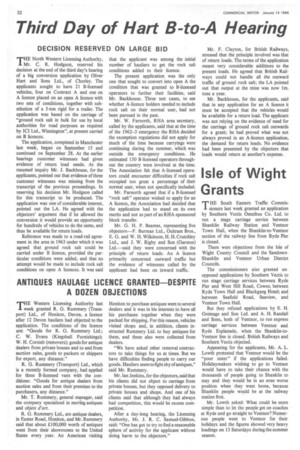Third Day of Hart B-to-A Hearing
Page 34

If you've noticed an error in this article please click here to report it so we can fix it.
DECISION RESERVED ON LARGE BID
THE North Western Licensing Authority, Mr. C. R. Hodgson, reserved his decision at the end of the third day's hearing of a big conversion application by Oliver Hart and Sons Ltd., of Chorley. The applicants sought to have 21 B-licensed vehicles, four on Contract A and one on A licence placed on an open A licence with two sets of conditions, together with substitution of a 3-ton rigid for a trailer. The application was based on the carriage of "ground rock salt in bulk for use by local authorities for road purpose's as required by ICI Ltd., Winnington", at present carried on B licences.
The application, completed in Manchester last week, began on September 15 and continued on September 28. At the earlier hearings customer witnesses had given evidence of return load needs. At the resumed inquiry Mr. J. Backhouse, for the applicants, pointed out that evidence of three customer witnesses was missing from the transcript of the previous proceedings. In reserving his decision Mr. Hodgson called for this transcript to be produced. The application was one of considerable interest, pointed out the LA. He agreed with the objectors' argument that if he allowed the conversion it would provide an opportunity for hundreds of vehicles to do the same, and thus be available for return loads.
Reference was made to a road-rail agreement in the area in 1963 under which it was agreed that ground rock salt could be carried under B licence, provided the particular conditions were added, and that no attempt would be made to include rock salt conditions on open A licences. It was said that the applicant was among the initial number of hauliers to get the rock salt conditions added to their licence.
The present application was the only one that sought to convert into open A the condition that was granted to B-licensed operators to further their facilities, said Mr. Backhouse. Three test cases, to see whether A-licence holders needed to include rock salt on their normal user, had not been pursued in the past.
Mr. W. Earnorth, RHA area secretary, called by the applicants, said that at the time of the 1962-3 emergency the RHA decided the exemption regulations did not apply for much of the time because carryings were continuing during the summer, which was outside the emergency conditions. He estimated 150 B-licensed operators throughout the country were involved at the time. The Association felt that A-licensed operators could encounter difficulties if rock salt occupied too great a percentage of their normal user, when not specifically included.
Mr. Farnorth agreed that if a B-licensed "rock salt" operator wished to apply for an A licence, the Association had decided that the application had to stand on its own merits and not as part of an RHA-sponsored block transfer.
Mr. G. H. P. Beames, representing five objectors—F. Burman Ltd., Oultram Bros., E. G. and W. H. Wilkinson, H. H. Crutchley Ltd., and J. W. Rigby and Son (Garston) Ltd.—said they were concerned with the principle of return loads. An A licence primarily concerned outward traffic but the evidence of witnesses called by the applicant had been on inward traffic.
Mr. F. Clayton, for British Railways, stressed that the principle involved was that of return loads. The terms of the application meant very considerable additions to the present loads. He agreed that British Railways could not handle all the outward traffic of ground rock salt; the LA pointed out that output at the mine was now lm. tons a year.
Mr. Backhouse, for the applicants, said that in any application for an A licence it must be accepted that the vehicles would be available for a return load. The applicant was not relying on the evidence of need for the carriage of ground rock salt outwards for a grant; he had proved what was not always proved in an A-licence application, the demand for return loads. No evidence had been presented by the objectors that loads would return at another's expense.
















































































































































